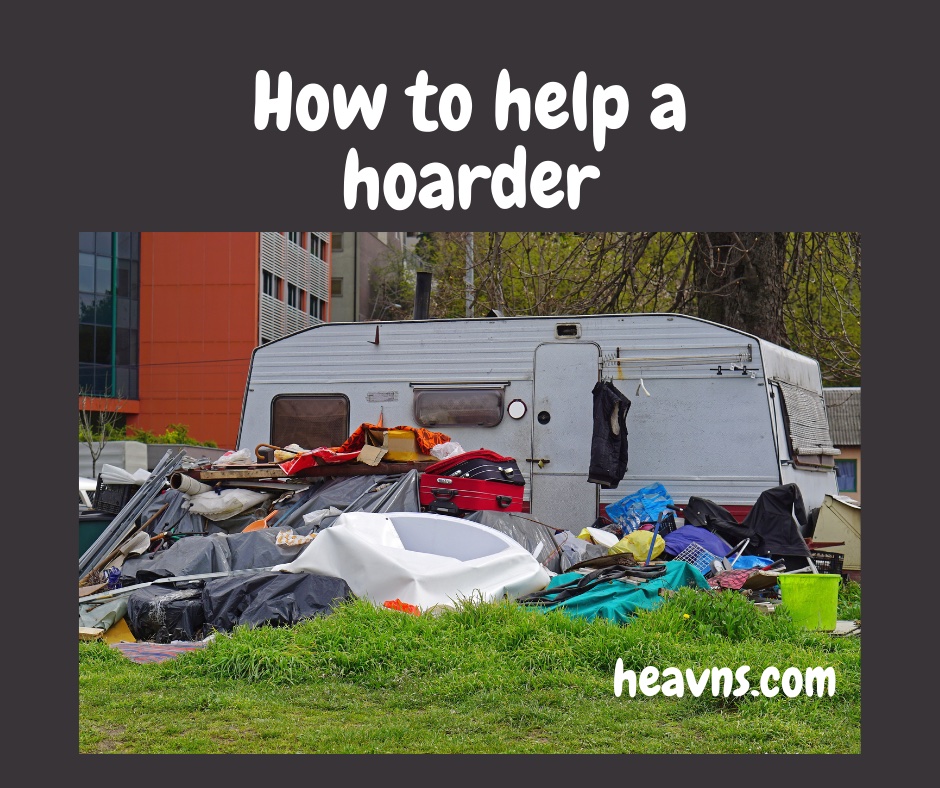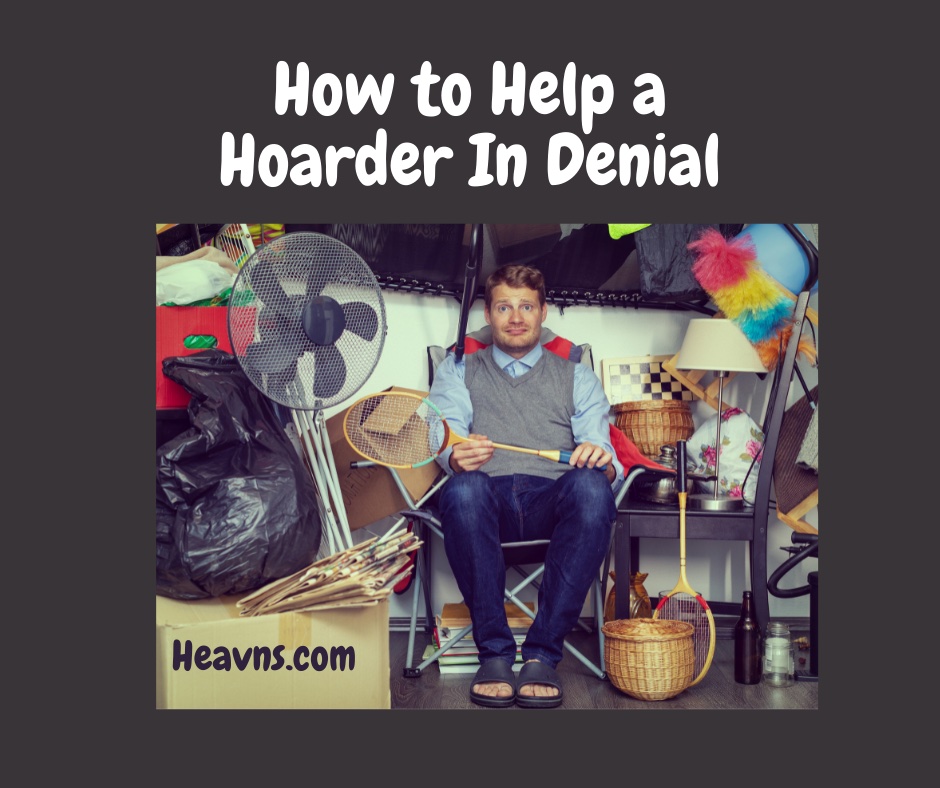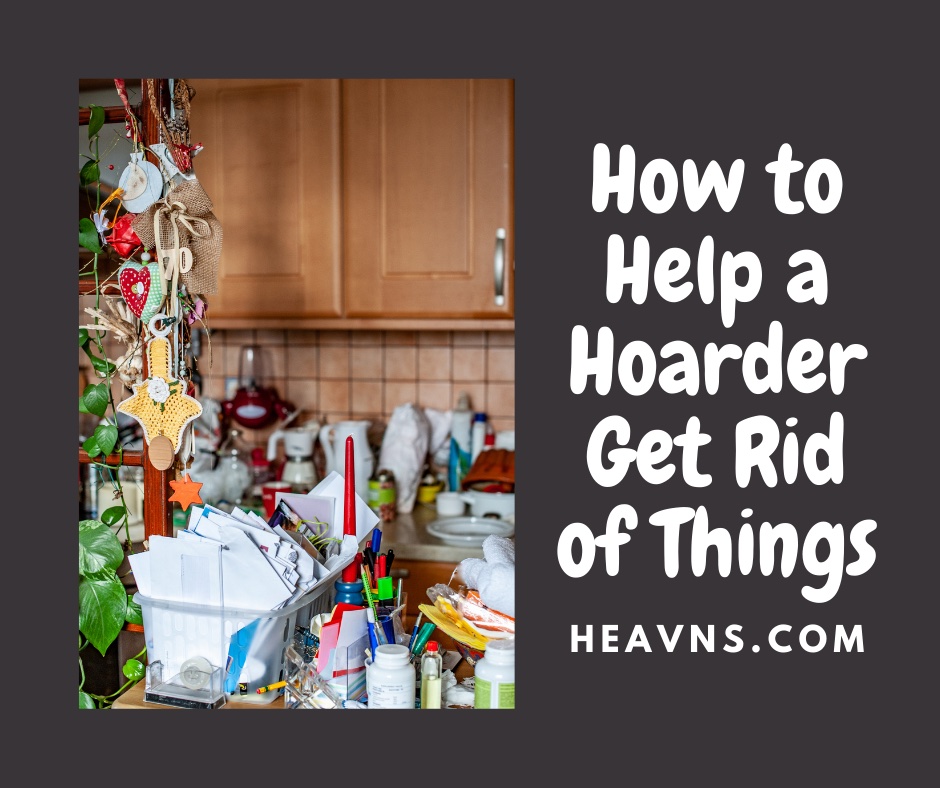Contents
- How to Help a Hoarder in 5 Easy Steps
How to Help a Hoarder in 5 Easy Steps
Hoarding is a mental disorder that affects millions of people in the United States.
According to the American Psychiatric Association, hoarding is due to a perceived desire to keep objects. People with hoarding disorder have difficulty getting rid of or parting with possessions. Attempts to give up possessions cause significant distress, leading to keeping them. The consequent clutter makes it difficult to use living areas.
If you know someone who is a hoarder, there are ways that you can help them.

What is hoarding? What are the signs of hoarding?
Compulsive hoarding behavior can vary significantly in tendencies and behaviors. However, there are some general signs that someone may be a hoarder. These include compulsive hoarding of items, difficulty parting with possessions, and a lack of interest in living in a clean and organized space.
If you notice any of these hoarding disorder signs in someone you know, it may be wise to seek out help from a mental health professional specializing in compulsive hoarding.

What sort of things do people hoard?
When it comes to compulsive hoarding, nothing is off-limits. Some common items hoarded may include:
- Clothing
- Vehicles
- Collectibles
- Food
- Paper
- Books
- Soda cans
- Pets
- Boxes
- Storage containers
- Things they view as valuable but need fixing
- Used medical supplies
- Garbage
What Causes Hoarding?
There is no one answer to this question as hoarders can have a variety of reasons for hoarding behavior, but some common mental health issues include:
- Trauma or abuse in childhood
A hoarder may have experienced trauma or abuse in childhood that has led to hoarding behavior. This can be a difficult diagnosis to make, as hoarders may be unwilling or unable to discuss their past. However, a thorough evaluation by a qualified therapist may help identify the root of the hoarding problem. In some cases, hoarders may also require treatment for addiction or mental health issues. - Fear of abandonment or feeling lonely
There are many reasons why someone may hoard, but one of the most common is fear of abandonment or feeling lonely. If you’re a hoarder and you’re feeling this way, here are five easy steps to help:- Talk to someone you trust about your problem. It can be really helpful to have someone you can talk to about your fears and feelings and who can offer constructive advice.
- Make a list of all the things you hoard and why. This will help you understand what triggers your hoarding behavior and give you some ideas on dealing with it.
- Break down your hoarding behavior into smaller, more manageable tasks. This will help you take one step at a time and break the hoarding cycle.
- Set realistic goals for yourself, and make sure you stay motivated. It can be tough to break the habit of hoarding, but you can achieve success if you stick to your plan.
- Take care of yourself physically and emotionally. Make sure to get enough sleep, eat nutritiously, and take regular breaks. Hoarders often find it hard to relax, leading to more hoarding behavior.
- Obsessive-compulsive disorder (OCD)
Obsessive-Compulsive Disorder, or Ocd, is a mental disorder characterized by recurrent, intrusive thoughts or images that cause distress or interfere with daily life.
People with Ocd often feel driven to perform certain rituals or routines to reduce the anxiety or distress caused by their obsessions. Unfortunately, these rituals can often become so time-consuming and cumbersome that they significantly impact the person’s quality of life. - Phobias
Phobias are a type of anxiety disorder that is characterized by an intense fear of certain objects, situations, or animals. People with phobias often have problems controlling their fear, and as a result, they may become hoarders.
Hoarding is a common symptom of phobias, as people with phobias often accumulate large amounts of objects or animals that they fear in order to avoid experiencing the fear again. - Compulsive buying
Compulsive buying and hoarding are two mental disorders that share some common symptoms, such as an excessive need to acquire things, difficulty parting with possessions, and a reluctance to let go of belongings. However, compulsive buying and hoarding can also have different causes and manifest differently.
Compulsive buying is typically characterized by an intense desire to buy items that the person cannot afford or does not need. This can lead to an accumulation of unnecessary things, which can be a source of stress and anxiety.
On the other hand, hoarding is characterized by an inability or unwillingness to part with possessions even when they are no longer needed or when they become a source of clutter and stress. Again, this can lead to the accumulation of possessions. - Reality distortion syndrome (RDS)
Reality distortion syndrome (Rds) is a mental disorder characterized by a distortion of reality, leading to problems with daily functioning.
People with Rds typically have a hard time distinguishing between reality and their own beliefs and perceptions. This can lead to problems with everyday life, such as difficulty completing tasks, making decisions, and interacting with others.
People with Rds often have a hard time recognizing that they have a problem. They may believe that their possessions are important and that they need them to be happy. They may also think that their possessions are safe and that no one else should have them.
People with Rds often hoard items, which can lead to problems. Hoarding can interfere with daily life by causing clutter and potential safety issues.

What are the Risks of Hoarding?
It is essential to seek help if someone you know is hoarding, as the risks of hoarding are serious and can be life-threatening.
- Hoarding Health Risks
There are many risks associated with hoarding, including health risks, financial risks, and social risks.
Hoarding can lead to health risks, such as respiratory problems and skin infections, as well as safety risks, such as fire hazards. - Hoarding Financial Risks
Hoarding can also lead to financial risks, such as losing property or possessions, and social risks like isolation from friends and family. - Hoarding Psychological Risks
The risks of hoarding are also psychological, with mental health risks including anxiety, depression, and PTSD.
How Can You Help a Hoarder?
Here are some general steps that may be helpful in helping someone who is a hoarder. These include:
- Offering support
Hoarders often feel isolated and unsupported, leading to anxiety and depression. It can be helpful to provide emotional support and help the hoarder find ways to spend time outside of the clutter-filled environment. If you know someone who is hoarding, the first step is to understand what is driving the behavior. You can do this by asking questions and listening carefully. - Encouraging change
Hoarders often resist making changes to their homes, leading to feelings of frustration and isolation. It can be helpful to encourage the hoarder to take a step back and look at their existing possessions in a new way. This may require some time and effort, but it is essential to help the hoarder learn to break the cycle of hoarding. - Providing resources
Hoarders often have difficulty accessing resources that help manage possessions, such as organizing bookshelves or filing cabinets. It can be helpful to provide resources, such as books on clutter management or organizing apps. Consider helping the hoarder find a professional therapist or counselor, providing storage space for their possessions, and helping them connect with other people who share their interests.
5 Ways to Help A Hoarder
Does your loved one struggle with clutter and piles of stuff? Do you worry about their safety and health? If so, it may be time for you to speak up.
Your offer to help clean up may be rejected unless the hoarder is ready to change their ways.
- Be understanding and supportive. Let them know that they are not alone and that help is available.
- Don’t criticize or judge. Hoarders can be self-critical, and it can be challenging to accept help.
- Be patient. Hoarders may take a while to accept help, but with patience and understanding, they will eventually respond.
- Don’t insist on taking everything away. It can be challenging for hoarders to let go of possessions but try not to make it about you.
- Offer to help them organize their belongings. This can be a difficult task, but with help, it can be manageable.

How to help a hoarder organize on clean up day
You finally convinced the hoarder in your life to let you help them to clean up.
If you are a family member feeling overwhelmed due to your loved ones hoarding tendencies, consider hiring a professional organizer prior to the clean-up day. They will develop a plan to approach cleaning up a hoarding situation.
- Establishing boundaries
Hoarders often feel overwhelmed by their possessions and may not part with them easily. Before starting a hoarding clean-up, it can be helpful to set limits on how much clutter the hoarder can have and make sure that the hoarder has a place to store belongings without being surrounded by them. - Don’t criticize their messes or efforts for cleaning up
Clean up may progress slowly but be careful not to criticize the hoarder’s progress even if it is slower than you’d like. - Challenge their thinking
Ask them to consider why they keep acquiring things and how it is impacting their life. - Encourage them to take small steps to change their behavior
This may include clearing a space on their shelf for new acquisitions and helping them to make the transition to a more efficient way of living. - Offer gentle guidance and suggestions
Keep in mind hoarding is often a mental illness, and hoarders may need time to accept help. Be patient and understanding and offer support as they make the necessary changes. - Create a family member plan for clutter-free living
A hoarder’s life is a constant battle against the compulsive acquiring of objects.
Hoarding often leads to negative consequences such as difficulty maintaining relationships and difficulty functioning in daily life.
It is vital to have a plan in place to help a hoarder live a clutter-free life. This includes creating a family plan for loved ones in the household where everyone has a job and responsibilities to help manage the hoarding. This way, everyone can be working together to create a manageable and healthier space. In addition, family therapy may be needed. - Practice gratitude for the things they do get done, no matter how small they may seem to you or them
Hoarders often feel overwhelmed and stressed by the accumulation of objects, which can lead to negative consequences such as difficulty maintaining relationships and difficulty functioning in daily life.
It is important to practice gratitude for the small things in life, even if they seem insignificant to you or the hoarder. This can help shift their focus from the negative to the positive and help them feel more in control of their lives. - Keep the conversation going while keeping it positive.
Keep the lines of communication open.
Keeping the lines of communication open is critical when trying to help a hoarder. This is because hoarders often isolate themselves from others and may not be aware that they are causing problems. Therefore, it is essential to be patient and persistent in getting them help. However, it is also important not to let them control the conversation.
If they are resistant to seeking help, be willing to offer suggestions on how to get help on their own. However, do not push too hard, or they may withdraw even further into their disorder.

How to help a hoarder conclusion
If you are struggling with how to help a hoarder, it is important to get help. Many home care resources are available to both the hoarder and their loved ones. Professional help can make the process easier for everyone involved.
Cleaning up and getting organized can be a daunting task, but it is worth it in the end. With time and patience, you can overcome this obstacle together.
Common compulsive hoarding questions
How to help a hoarder in denial?
Anyone who has watched an episode of “Hoarders” is familiar with the heartbreaking sight of a person in denial about their hoarding problem. They refuse to believe they have a problem, and as a result, they are unable to get help.
If you know someone who is a hoarder and in denial, there are steps you can take to help them get the help they need.
First, talk to them about the problem and try to get them to understand that they do have a problem.
Next, encourage them to seek professional help.
Finally, be there for them when they go through treatment and offer your support.
By taking these steps, you can help a hoarder in denial get the help they need before it’s too late.
Do you know how to confront a hoarder?
The first step is to try and understand why they are hoarding. There could be any number of reasons, from anxiety and depression to a lack of coping skills or even dementia.
Once you better understand the underlying issues, you can start to work on a plan to address them. This might include therapy, medication, or help from family and friends.
If the person is unwilling or unable to seek help, there may come a time when you have to take more drastic measures such as calling social services or even staging an intervention.
How to help a hoarder get rid of things?
- Understand that the hoarder is not doing this on purpose. The behavior is usually triggered by some sort of emotional need, such as feeling safe or being in control.
- Respect the hoarder’s feelings and don’t try to force them to get rid of anything. This will only make them more resistant and could damage the relationship you have with them.
- Suggest taking small steps instead of trying to tackle the entire project at once. For example, suggest sorting through one pile of papers at a time or getting rid of one item each day.
- Offer to help them sort through their belongings and provide support along the way.
What are the symptoms of hoarding disorder?
Hoarding disorder is a severe mental health condition that can have a negative impact on your life and the lives of those around you.
If you think you may be suffering from hoarding disorder, it’s essential to seek help from a qualified professional.
Symptoms of hoarding disorder can vary from person to person. Still, some common signs include excessive collecting, difficulty discarding items, cluttered living spaces, and significant distress or impairment caused by the clutter.
If you are experiencing any of these symptoms, don’t hesitate to reach out for help. Support is available for people with hoarding disorder, and treatment can make a big difference in your life.
How much does hoarding clutter cost you?
It’s not only the emotional and mental toll of hoarding that should be considered but also the cost to your wallet.
The average hoarder spends $8,000 per year on excess items, which is money that could be going towards bills, groceries, or savings.
What is the outlook for people with hoarding disorder?
Although hoarding disorder is a serious mental health condition, treatments are available that can help people manage their symptoms and live more fulfilling lives.
With treatment, many people with compulsive hoarding are able to reduce the clutter in their homes and improve their quality of life.
If you or someone you know is struggling with hoarding disorder, please seek professional help. There is hope for recovery.
Hoarding in the News
- Barstow California firefighters were unable to fight a house fire due to extreme hoarding conditions. Read the article here.
- Crews battle house fire in Dayton OH. Firefighters initally went inside the house to fight the fire but soon discovered a large hole in the floor. The home was extremely hoarded over. Read about it here
- Man Found Dead, Mother Hospitalized After Police Find ‘Extreme Hoarding’ Conditions. Read about it here.

bono de registro en Binance
Friday 19th of April 2024
I don't think the title of your article matches the content lol. Just kidding, mainly because I had some doubts after reading the article.
binance US registrieren
Monday 5th of February 2024
Can you be more specific about the content of your article? After reading it, I still have some doubts. Hope you can help me. https://accounts.binance.com/de-CH/register-person?ref=OMM3XK51
Tài khon binance
Tuesday 16th of January 2024
Your point of view caught my eye and was very interesting. Thanks. I have a question for you. https://www.binance.info/vi/join?ref=OMM3XK51
cuenta de Binance
Friday 5th of January 2024
Can you be more specific about the content of your article? After reading it, I still have some doubts. Hope you can help me. https://www.binance.info/es/join?ref=V2H9AFPY
Εγγραφείτε για να λάβετε 100 USDT
Thursday 13th of April 2023
Thanks for sharing. I read many of your blog posts, cool, your blog is very good.